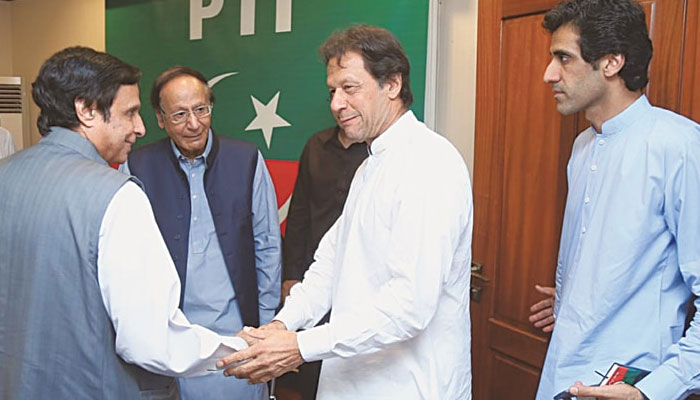Ruling coalition: Junior partners demanding their pound of flesh
ISLAMABAD: Five smaller components of the Pakistan Tehreek-e-Insaf (PTI) led ruling coalition have abruptly sounded alarm bells in a remarkable unison, shocking the senior partner, as if they jointly decided to tread this path one after the other in short span of time.
A common demand projected by all of them is that the federal government has not fulfilled the promises and commitments made with them at the time of cobbling together the coalition after the 2018 general elections. In the past too, they have project their displeasure but this time, the discontentment is more pronounced.
A question that is circulating in many minds is why the Muttahida Qaumi Movement-Pakistan (MQM-P), Grand Democratic Alliance (GDA), Pakistan Muslim League-Q (PML-Q), Balochistan National Party-Mengal (BNP-M) and Balochistan Awami Party (BAP) simultaneously raised almost similar protesting voices, jolting the government, which is confronted with a precarious numbers game in the National Assembly to sustain. The scenario impelled it to engage in prompt firefighting.
These four junior associates of the alliance have a total of 19 members in the National Assembly, a tally, which is more than the double the numbers required to cause the swift collapse of the coalition.
When contacted by The News, senior government spokesman Sadaqat Abbasi expressed the hope that their partners will not abandon the government and will continue to stand behind it. “None of them has spoken of leaving the regime. Even if one has walked out of the federal cabinet, he too vowed to persist with carrying on the support to the government.”
He said the allies’ grievances specifically related to their constituencies where they want funds for development projects. He conceded that the first year of the government was difficult financially which made incapacitated it to release a good amount of funds.
Abbasi said that the allies’ protest is perfectly as per the standards pattern as they think that it is the opportune to get the pledges made by the government implemented when it is confronted with different political challenges like doing critical legislation including the amendments in the National Accountability Bureau (NAB) law.
The spokesman said that the prime minister has assigned responsibility of satisfying the estranged partners, who are holding talks with them. The process will be result-oriented and productive; he expected and dispelled the impression that their protest was part of any greater plan to oust the government.
It was widely averred that the regime gained and major opposition parties – the PML-Nawaz and Pakistan People’s Party (PPP) – lost because of their respective policies on the law giving three-year extension to Gen Qamar Javed Bajwa as the army chief. Coming on the heels of the parliamentary approval of the legislation, the junior partners of the government have opened a Pandora’s Box by venting out their complaints and demands.
However, a general feeling is that the agitating voices have not been as spontaneous as the government thinks because none of its allies is known for acting on its own. How and why the MQM-P, PML-Q and GDA spring into action by showing loud reservations against the government is no secret.
There was a marked synchronization between their new strategies. First one was the MQM-P that jolted the government as its Convener Khalid Maqbool Siddiqui announced that he has resigned his federal cabinet position. Prior to this declaration, neither he nor his party has stated the “injustice” being done to the Karachiites.
Siddiqui was called by Prime Minister Imran Khan to the federal capital for a meeting but he did not turn up, demonstrating he sticks to his stand. Before that, the government point man Federal Minister Asad Umar’s session with Siddiqui turned out to be a futile exercise.
The grievances of the PML-Q are not new. It has been articulating on different occasions in its own way. One of them is that the government has not lived up to its commitment of inducting its two MPs in the federal cabinet. Tariq Bashir Cheema is the only minister representing it. Its second nominee is Moonis Elahi, son of Punjab Assembly Speaker Chaudhry Parvaiz Elahi, but he has not taken in the cabinet even after the lapse of 18 months. To loudly convey the PML-Q’s annoyance a day before a meeting of the prime minister’s team with the Chaudhrys, Cheema stayed away from the federal cabinet meeting. The move was meant to put pressure on the government to accept its demand when its delegation meets its leadership.
The Sindh government has tried to placate the GDA, at least verbally, but its complaints remain intact. The BAP complains that despite pledge, it has not been representation in the federal cabinet.
The BNP-M, which has been showing uneasiness with the government since word go but still siding with it and voting in its favour in the parliament, is holding an important meeting on Jan 19 to take a final decision about its alignment with the regime. Akhtar Mengal’s often grumbles that his party’s main demands including recovery of missing persons incorporated in an agreement signed with it have not been accepted.
-
 Gigi Hadid Talks About 'relieving Tension' Amid Having Hashimoto's Disease
Gigi Hadid Talks About 'relieving Tension' Amid Having Hashimoto's Disease -
 Sarah Ferguson Is 'persona Non Grata', Prince William Makes It Clear To Everyone
Sarah Ferguson Is 'persona Non Grata', Prince William Makes It Clear To Everyone -
 Northern Lights Alert On Valentine’s Day: How, Where & Best Time To Watch Auroras
Northern Lights Alert On Valentine’s Day: How, Where & Best Time To Watch Auroras -
 Dennis Quaid Reveals What Keeps His Marriage To Laura Savoie Healthy
Dennis Quaid Reveals What Keeps His Marriage To Laura Savoie Healthy -
 Mustafa Suleyman Says Microsoft Is Building Its Own AI Superintelligence
Mustafa Suleyman Says Microsoft Is Building Its Own AI Superintelligence -
 Jessica Alba, Cash Warren Finalize Divorce After 16 Years Of Marriage
Jessica Alba, Cash Warren Finalize Divorce After 16 Years Of Marriage -
 China’s AI Boom Takes Center Stage At Spring Festival One Year After DeepSeek Stirred The Industry
China’s AI Boom Takes Center Stage At Spring Festival One Year After DeepSeek Stirred The Industry -
 James Van Der Beek Called His Sixth Child Jeremiah 'healing For Us' Before His Death
James Van Der Beek Called His Sixth Child Jeremiah 'healing For Us' Before His Death -
 Elon Musk Vs Reid Hoffman: Epstein Files Fuel Public Spat Between Tech Billionaires
Elon Musk Vs Reid Hoffman: Epstein Files Fuel Public Spat Between Tech Billionaires -
 Gordon Ramsay Denies Victoria Beckham Got Handsy With Brooklyn At His Wedding
Gordon Ramsay Denies Victoria Beckham Got Handsy With Brooklyn At His Wedding -
 Gordon Ramsay Makes Unexpected Plea To Brooklyn As He Addresses Beckham Family Feud
Gordon Ramsay Makes Unexpected Plea To Brooklyn As He Addresses Beckham Family Feud -
 Prince Harry Warns Meghan Markle To 'step Back'
Prince Harry Warns Meghan Markle To 'step Back' -
 Selena Gomez Explains Why She Thought Lupus Was 'life-or-death'
Selena Gomez Explains Why She Thought Lupus Was 'life-or-death' -
 New Zealand Flood Crisis: State Of Emergency Declared As North Island Braces For More Storms
New Zealand Flood Crisis: State Of Emergency Declared As North Island Braces For More Storms -
 Nancy Guthrie Case: Mystery Deepens As Unknown DNA Found At Property
Nancy Guthrie Case: Mystery Deepens As Unknown DNA Found At Property -
 James Van Der Beek's Brother Breaks Silence On Actor's Tragic Death
James Van Der Beek's Brother Breaks Silence On Actor's Tragic Death




